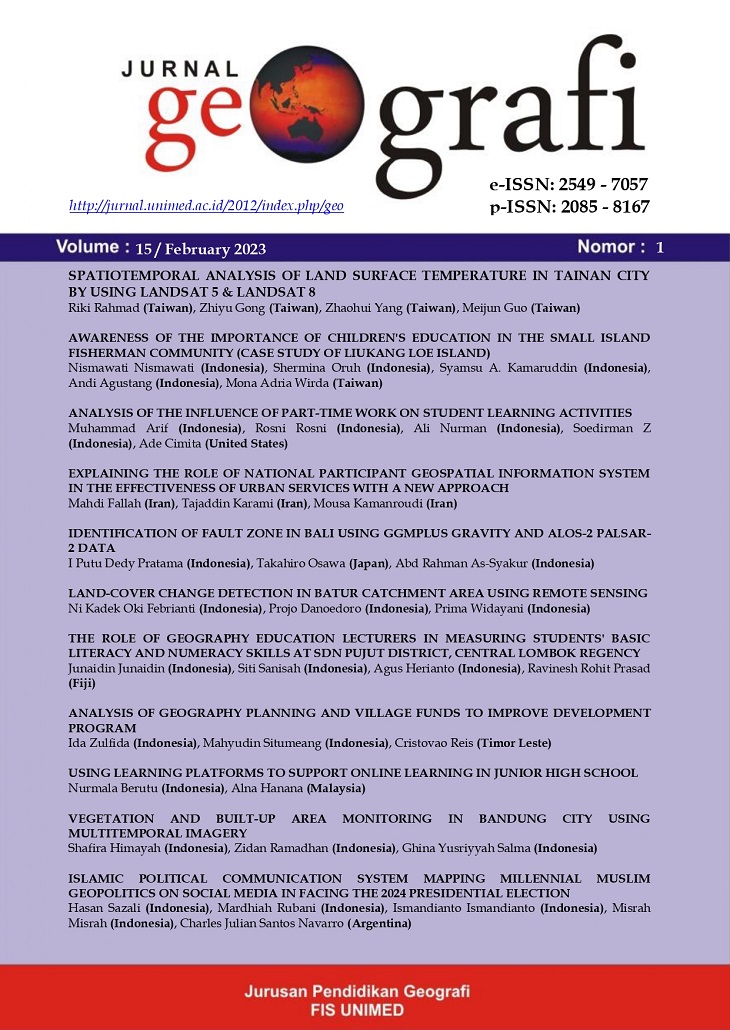Islamic Political Communication System Mapping Millennial Muslim Geopolitics on Social Media in Facing the 2024 Presidential Election
DOI:
https://doi.org/10.24114/jg.v15i1.42477Abstract
In political preferences, religion plays a vital role as a consideration for the millennial generation. This is because Indonesia still considers religion in setting policies as it does in political parties and general elections. This study analyzes the political communication system of millennial Muslim Islam on social media in the face of the 2024 presidential election (netnographic analysis). This study applies the netnographic research method through a qualitative approach to understand how the Islamic political communication system works in millennial Muslim society on social media and the geopolitics of millennial Muslims in Indonesia in the face of the 2024 presidential election. Data collection uses analytics related to election data”President in 2024. The study results show that the application of political communication among millennial Muslims on social media is in the form of support and criticism on the hashtag #pemilu2024. Social media proves that distance and time limits are not obstacles to voicing opinions, criticizing and supporting each other. Several things that can be done to map Islamic political communication systems and millennial Muslim geopolitics on social media include: (1) Analyze Islamic political trends that occur on social media, such as Twitter, Facebook, and Instagram, by searching for keywords related to Islamic politics and monitor how communication patterns are between Muslim millennials; (2) Understanding millennial Muslim sentiments on social media by reading and monitoring conversations on social media; and (3) understand the patterns used in communicating, taking into account the type of content they share, the frequency of social media use, as well as the most used platforms. Too much social media reach without knowing boundaries makes social media challenging to control. The strength of political competition becoming increasingly evident must be accompanied by carefulness in filtering information not to complicate the situation. As millennials amid vulnerable hostilities, they should be able to become pioneers or fortresses in avoiding the opposing currents of the impact of social media in political times.Keywords: Political Communication, Millennial Muslims, Geopolitical Mapping, Social Media, Presidential ElectionReferences
Akbar, N. A., & Nasrullah, N. (2021). Nama-Nama Ini Konsisten di 6 Besar Survei Capres 2024. Republika.Co.Id. Retrieved from https://www.republika.co.id/berita/qxvpxm440/namanama-ini-konsisten-di-6-besar-survei- capres-2024
Asosiasi Penyelenggara Jasa Internet Indonesia. Hasil Survei Penetrasi dan Perilaku Pengguna Internet Indonesia 2018. (2019). https://apjii.or.id/content/read/39/410/Hasil-Survei-Penetrasi-dan-Perilaku-Pengguna-Internet-Indonesia-2018
Bardan, A. B. (2021, September). KPU rencanakan pemilihan presiden dan pemilu legislatif pada 21 Februari 2024. Kontan.Co.Id. Retrieved from https://nasional.kontan.co.id/news/kpu-rencanakan-pemilihan-presiden-dan-pemilu- legislatif-pada-21-februari-2024
Cahyono, A. S., Pengaruh Media Sosial Terhadap Perubahan Sosial Masyarakat Di Indonesia. In Publiciana, 9(1). https://doi.org/10.36563/publiciana.v9i1.79
Charities Aid Foundation. The CAF World Giving Index (9th ed). (2018). https://www.cafonline.org/about-us/publications/2018-publications/caf-world-giving-index-2018
Charities Aid Foundation. The CAF World Giving Index. (10th ed). (2019). https://www.cafonline.org/about-us/publications/2019-publications/caf-world-giving-index-10th-edition
Damsar. (2013), Pengantar Sosiologi Pendidikan. Jakarta: Kencana. Hlm. 207
Aldino, G., Mahayadnya, P., Noak, P. A., Wayan, N., Novi, R., & Pembangunan, P. P. (2014). Politik Identitas Muslim Kampung Jawa Denpasar. 1“6.
Culcasi, K. (2016). Images and Imaginings of Palestine: Territory and Everyday Geopolitics for Palestinian Jordanians. Geopolitics, 21(1), 69“91. https://doi.org/10.1080/14650045.2015.1100993
Duarte, E. F. B., Erviantono, T., & Azhar, M. A. (2016). Hubungan Negara Dan Agama ( Studi Kasus Peran Aktor Religius Dalam Konstelasi Politik Timor - Leste ). 1“6. https://ojs.unud.ac.id/index.php/politika/article/download/21668/14348
Effendi, F. P., & Dewi, D. A. (2021). Generasi Milenial Berpancasila di Media Sosial. Journal Civics & Social Studies, 5(1), 116“124. https://doi.org/10.31980/civicos.v5i1.1051
Harahap, M. A., & Adeni, S. (2020). Tren penggunaan media sosial selama pandemi di indonesia. Jurnal Professional FIS UNIVED, 7(2), 13“23.
Hasan, N., Ikhwan, M., & Ichwan, M. N. (2018). Membaca Kecenderungan Pemikiran Islam. Harmoni, 17(1), 177“184.
Johnson, M. H. (2018). Geography, political economy and the ˜personality of Britain.™ Post-Medieval Archaeology, 52(1), 49“64. https://doi.org/10.1080/00794236.2018.1460151
Kusnanto Anggoro. (2016). Jurnal Kajian Lemhannas RI. Jurnal Kajian Lemhannas RI, 26, 1“83.
Ladwig, P. (2014). Millennialism, charisma and utopia: Revolutionary potentialities in pre-modern Lao and Thai TheravÄda Buddhism. Politics, Religion and Ideology, 15(2), 308“329. https://doi.org/10.1080/21567689.2014.899067
Lestari, Y. S. (2019). Peranan Partai Politik Islam Terhadap Sistem Pemerintahan Di Indonesia Yeni. Journal of Chemical Information and Modeling, 53(9), 1689“1699.
Lin, S., Sidaway, J. D., & Woon, C. Y. (2019). Reordering China, Respacing the World: Belt and Road Initiative (一带一路) as an Emergent Geopolitical Culture. Professional Geographer, 71(3), 507“522. https://doi.org/10.1080/00330124.2018.1547979
Malik, D. K. (2016). Partai Politik Islam dan Pemilihan Umum Studi Peningkatan Dukungan Elektoral PKB dan PPP Pada Pemilu Legislatif 2014 DPR RI di Dapil DKI Jakarta. Politik Indonesia: Indonesian Political Science Review, 1(1), 46. https://doi.org/10.15294/jpi.v1i1.9180
Manese, R. M., & Nurhamidin, B. (2021). Relasi Agama Dan Politik: Preferensi Politik Pemilih Millenial Di Ponosakan Belang, Dalam Pilkada Sulawesi Utara Tahun 2020. Riayah: Jurnal Sosial Dan ¦.
Pearce, S. (2019). Young people, place and devolved politics: perceived scale(s) of political concerns among under 18s living in Wales. Social and Cultural Geography, 20(2), 157“177. https://doi.org/10.1080/14649365.2017.1355066
Saunders, R. A. (2019). Geopolitical television at the (b)order: liminality, global politics, and world-building in The Bridge. Social and Cultural Geography, 20(7), 981“1003. https://doi.org/10.1080/14649365.2017.1404122
Sazali, H., Islam, U., & Sumatera, N. (2022). Communication Of Women Muslim Politicians In Indonesia ( Analysis Of Regional Head Election Campaign Messages In Social Media ) Komunikasi Politisi Perempuan Muslim Di Indonesia ( Analysis Pesan Kampaye Pemilihan Kepala Daerah Di Media Sosial ) Program St. 1“17.
Semetko, Holli.A & Scammel, M. (2012). Etnografi sebagai Teori dan Metode dalam Studi Komunikasi Politik: Handbook Komunikasi Politik. Sage Publications Ltd Nusamedia.
Suslov, M. (2018). œRussian World Concept: Post-Soviet Geopolitical Ideology and the Logic of œSpheres of Influence. Geopolitics, 23(2), 330“353. https://doi.org/10.1080/14650045.2017.1407921
Utami, F. (2020). Media Sosial Dan Partisipasi Politik Milenial Riau. Jdp (Jurnal Dinamika Pemerintahan), 3(1), 65“84. https://doi.org/10.36341/jdp.v3i1.1158
YPH, Nikken. Wahyudi, Sigit. Suttaphalaka, Kahnwa. Irawan, A. dkk. (2015). The Power Of Media (S. W. Angga Irawan, Nikken Yulia P (ed.); 1st ed.)







